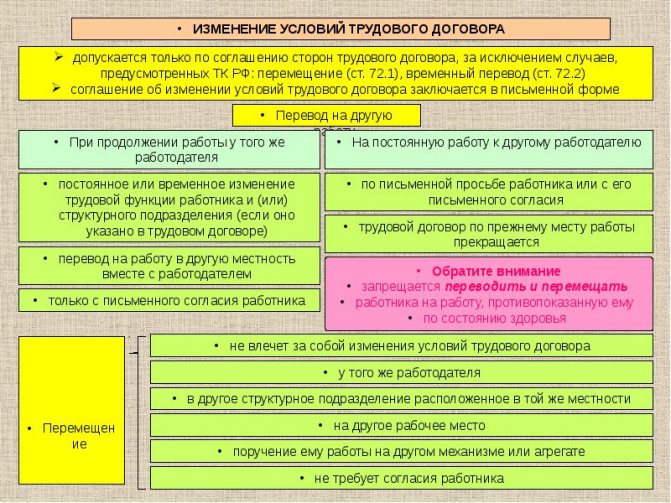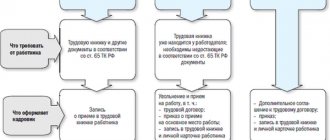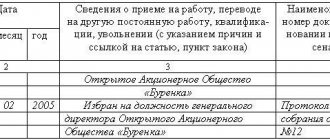General information
Internal and external transfer to another job
Transfer from work to another can be both internal and external. This depends on the movement of employees within the organization or the release of job vacancies at other enterprises.
More details about translation:
- Internal involves changing jobs in the same organization. The employee has the right to move to another department or change position. This is possible only in agreement with the manager, but the only exceptions are unforeseen circumstances, for example, natural disasters, emergencies and other incidents.
- The concept of external transfer is the complete termination of an employment contract with an employer and the conclusion of an employment agreement with another within a month.
When an employee moves to another place, but if the company remains the same and dismissal is not required.
Transfer to another organization: features
The Law of the Labor Code of the Russian Federation states that transfer to another organization is a changed labor function of an employee, characterized by the termination of cooperation with the previous employer and the conclusion of an agreement with a new one.
If we consider the process on a larger scale, then from a legal point of view, a transfer is a dismissal and a job at the same time. The peculiarity of such employment is that the guarantee of acquiring a new job is 100% guaranteed; otherwise, the employee will be protected by the law.
Dismissal process through transfer
Concluding an agreement with another employer is the initiative of the employee himself. The following benefits remain:
- guarantee of employment with another representative of the employer;
- compensation for expenses associated with moving to another area of residence in full.
If an employee is transferred at the latter's request, it is necessary to submit a specially designed letter of invitation to another job from the future employer.
The contents of this letter must include the following information:
- full surname and initials of the employee;
- proposed position;
- when the transition will take place;
- certified by the signature of the head with the details of the organization.
With this letter you must attach a letter of resignation stating the reason for the transfer, and it is recommended to indicate the name of the company in full. If the transfer is initiated by the employer himself, then the transfer to another place of work is carried out by agreement of three parties: the employee and two employers.
Features of the procedure
Termination of the employment relationship occurs after the manager’s order, issued on the basis of the employee’s resignation letter (Article 84.1 of the Labor Code of the Russian Federation).
The procedure for dismissing an employee on his initiative:
- The future manager draws up a letter of invitation regarding the employee on the company's letterhead. The date of admission and the position for which the person will be employed is indicated.
- The employee writes an application and submits it to the manager for approval.
- A notice of transfer is sent to the inviting party - confirmation of consent to release the subordinate. Certified by the employee's signature.
When all the nuances of leaving are agreed upon by the three parties, an order is issued in form T-8, indicating the reason for dismissal. The signature of the employee leaving the company is required. The final settlement with the employee is made, the work book is filled out and issued to the employee (Article 77 of the Labor Code).
ATTENTION! The last working day is determined by the date specified in the order.
The transfer rules differ if the manager has a desire to fire a person:
- Employers agree among themselves to hire a person.
- Notify the subordinate in the form of a written notice.
After the citizen confirms his consent to change his place of work, the procedure is formalized in the same way as for dismissal by agreement of the parties.
Invitation from a new place of work
A letter drawn up in any form must be sent, regardless of who initiated the severance (or conclusion) of the employment relationship. The invitation states:
- name of the new company;
- last name, first name, patronymic of the person invited to work;
- position and working conditions;
- date of expected employment.
The document is sent either to the head of the company or personally to the employee.
Statement
This personnel document contains:
- Full name of the employee;
- the name of the company where the employee is moving;
- data of the future leader;
- request for transfer.
At the end there is a number and signature of the applicant.
More details about this are written here.
Order
The manager's dismissal order includes:
- date of compilation;
- company name;
- the reason and method of termination of the employment relationship (wording, link to the Labor Code article);
- name and number of the order;
- information about the employee (personnel number, full name, position).
Approved by the signature of the head of the enterprise and seal.
Organization of the translation process
The procedure for transferring to another job through dismissal
After a package of documents has been collected, it must be submitted to the human resources department or the person who is involved in personnel work. The transfer is carried out according to the following scheme:
- An administrative document is prepared based on the employee’s application or a tripartite agreement.
- The document is agreed upon with the interested parties, after which the employee familiarizes himself with it and signs it.
- A dismissal card is filled out, which also requires the employee’s signature.
- It is required to make an entry in the work book with the date and serial number of the administrative document on dismissal.
- The final payment to the employee is made taking into account all due compensation on the final day of work.
- A work book and a certificate of the employee’s salary for the last 2 years worked at the enterprise are issued.
Is consent always necessary?
Some situations allow temporary transfer without the consent of the citizen. The Labor Code of the Russian Federation lists:
- technological disaster;
- natural disaster;
- industrial accident;
- industrial accident.
This refers to fires, floods, earthquakes, epidemics of people or animals, various industrial and any other emergencies leading to massive negative consequences. Workers are distracted from their main place of work to prevent these consequences.
The reason for a one-way transfer may be simple. The threat of damage to production property can also become a reason for a unilateral transfer to another department in order to replace absent employees. In both cases, the cause of the non-standard situation should be precisely the emergency situations listed above. Such an “emergency” transfer is only possible for 1 month. It must be paid no less than the average salary at the previous job.
If the transferee is required to perform work of a lower qualification, even under extraordinary circumstances, the employer must obtain his written consent. This is discussed in the Labor Code of the Russian Federation, Art. 72.2.
In connection with the topic under consideration, the provisions of Art. 74 of the Labor Code of the Russian Federation, which makes it possible to change the terms of an employment contract without the consent of the citizen who concluded it, however, taking into account the opinion of the trade union. The reason here refers to circumstances of a technological or organizational nature, which are usually called “production necessity.”
The article, on the one hand, speaks of the inadmissibility of changing the labor functions of employees (without disclosing the concept sufficiently). On the other hand, it allows for unilateral transfer not only from unit to unit, but also from one area to another, following the employer (Article 72.1-1 of the Labor Code of the Russian Federation). The administration must only warn the employee 2 months in advance and offer, if he does not agree, another workplace that is not harmful to health. If the employee refuses, he can be fired.
What compensation is due?
Pay slips are issued on the day of dismissal from the company. These are payments for working time and compensation for unused vacation.
Example of compensation charges. The employee quits on September 30, 2017, but during this year he did not use vacation at all. The duration of the vacation is 28 days. Then the company is required to provide compensation within 14 days.
When transferring to another job, the employee has the following privileges:
- guarantee of employment in another organization within 30 days from the date of dismissal;
- no probationary period is established.
Upon dismissal, all guarantees are lost.
Possible nuances
The law does not provide a specific period within which the transfer procedure must be officially established. All three parties agree on the dates specified in the invitation and application. The conclusion follows from this: the employee is considered dismissed on the day indicated in the document. But this does not guarantee subsequent employment at a new place of employment.
In order to solve this problem, a law was issued (Article No. 64 of the Labor Code of the Russian Federation): when transferred from one workplace to another, an employee must begin new duties within 30 days. It turns out that the date of dismissal and drawing up the contract can be any - the main thing is that the first working day in the new place takes place within a month after signing the contract. The transferred employee is also released from the probationary period.
Read also: Rules for keeping a log of job orders
How is admission to another organization carried out?
Admission to another organization upon transfer
When an employee starts working in another organization, he must:
- draw up an employment agreement;
- issue an administrative document on employment;
- fill out a personal card;
- make entries in the work book;
- provide instructions;
- obtain permission to work independently in the manner prescribed by regulatory documents.
It is equally important that the future employee undergo a medical examination before applying. Confirmation of health status is important for the employer.
Article 72.1 of the Labor Code of the Russian Federation. Transfer to another job. Moving
1. Article 72.1 of the Labor Code of the Russian Federation defines the concepts of “transfer to another job” and “relocation”. Transfer to another job in accordance with the commented article is a permanent or temporary change in the labor function of the employee and (or) the structural unit in which the employee works (if the structural unit was specified in the employment contract), while continuing to work for the same employer, as well as transfer to work in another area together with the employer. As follows from the content of the above norm, a change in other conditions determined by the employment contract (for example, working hours, wages) does not constitute a transfer to another job.
Transfer to another job, as well as changes to other terms of the employment contract determined by the parties, is possible only with the written consent of the employee. An exception to this rule is allowed only in the cases specified in Part 2 and Part 3 of Art. 72.2 (see commentary to them).
If a transfer to another permanent or temporary job with the same employer is carried out without the written consent of the employee, but he has started performing another job, such a transfer may be considered legal. However, the employee's performance of other work does not relieve the employer of the obligation to obtain written confirmation from the employee of such consent to the transfer.
In cases where an employee transferred to another job with the same employer has begun performing this work, but believes that the transfer was carried out in violation of the law, he can appeal the illegal transfer to the labor dispute resolution authorities.
2. Transfer to another permanent job or temporary transfer to another job with the same employer, as well as transfer to permanent work in another locality together with the employer, are formalized by order (instruction) of the employer.
When transferred to work in another area, employees are paid appropriate compensation: the cost of travel for the employee and his family members, the cost of transporting luggage, expenses for settling in a new place, etc. The specific amounts of reimbursement of expenses are determined by agreement of the parties to the employment contract (see commentary to Art. 169).
Another area should be understood as an area outside the administrative-territorial boundaries of the corresponding locality (clause 16 of the Resolution of the Plenum of the Armed Forces of the Russian Federation of March 17, 2004 No. 2).
A transfer to work from one locality to another, even within the same administrative district, is considered as a transfer to another locality, regardless of the availability of a bus or other regular service between these points.
The employee’s refusal to be transferred to another location together with the employer is grounds for termination of the employment contract with him under clause 9 of Art. 77 TK. Refusal to transfer to a branch or representative office of an organization located in another locality cannot be grounds for termination of an employment contract with an employee if the employer himself does not move to this other locality (see commentary to Article 77).
When employees are dismissed due to refusal to be transferred to another location together with the employer, they are paid severance pay in the amount of 2 weeks' average earnings (Part 3 of Article 178 of the Labor Code).
3. A transfer to work for another employer can be carried out at the request of the employee, stated in writing, or with his written consent, if the initiative for the transfer comes from the employer (Article 72.1 of the Labor Code of the Russian Federation).
Transfer to a permanent job with another employer entails a change in one party to the employment contract, therefore it is considered by the legislator as an independent basis for termination of the employment contract (clause 5 of Article 77 of the Labor Code). An employee invited to work in writing by way of transfer from another employer cannot be denied an employment contract within one month from the date of dismissal from his previous place of work (see commentary to Article 64 of the Labor Code of the Russian Federation). In this case, in the work book (Article 66 of the Labor Code in the new edition) of the employee, records are made about dismissal and hiring, indicating the order in which the dismissal was carried out in connection with the transfer - at the request of the employee or with his consent (clause 6.1 of the Instructions for filling out work books).
4. Transfer to another permanent job or temporary transfer to another job with the same employer is possible under various circumstances. In this case, the initiative for transfer can come from both the employer and the employee himself (for example, due to the fact that he has improved his qualifications).
In a number of cases, the employer has an obligation to transfer the employee with his consent to another job, for example, in the case when the employee needs, in accordance with a medical report, to be provided with another job (see commentary to Article 73).
In cases where the job to which the employee is transferred in accordance with a medical report is lower paid, the employee retains his previous average earnings for a month from the date of transfer, and in the case of transfer due to a work injury, occupational disease or other damage to health, related to work - until permanent disability is established or until the employee recovers (see commentary to Article 182).
In certain cases provided for by law, the employer is obliged to offer the employee a transfer to another job. Such an obligation may arise, for example, in the event of a reduction in staff, if the employer has another job for the employee subject to reduction (see commentary to Part 3 of Article 81). The employer is obliged to offer another job available to a person who, based on the results of certification, is recognized as not suitable for the position held (see commentary to Article 81).
5. From the transfer of an employee to another job, one should distinguish him from moving from the same employer to another workplace, to another structural unit located in the same area, or being assigned to work on another mechanism or unit. Such a move, in accordance with Part 3 of Article 72.1 of the Labor Code of the Russian Federation, does not require the consent of the employee if this does not entail a change in the terms of the employment contract determined by the parties (see commentary to Article 57).
In other words, a change in a workplace or structural unit can be recognized as a relocation only if, when concluding an employment contract, this specific workplace (mechanism, unit) or structural unit was not specified and is not provided for in the employment contract. If a specific workplace (mechanism, unit) or structural unit is specified in the employment contract, then it is its mandatory condition and, therefore, can only be changed with the written consent of the employee.
Structural divisions should be understood as branches, representative offices, as well as departments, workshops, areas, etc. (Clause 16 of the Resolution of the Plenum of the Armed Forces of the Russian Federation of March 17, 2004 No. 2).
Dismissal through transfer for different categories
For some categories of employees, individual solutions are used.
At the legislative level, it is not allowed to transfer young specialists to certain specialties that do not correspond to their profile through dismissal to another job. The transfer of a former student to the specialty in which he received a diploma is only welcome.
However, younger employees themselves should carefully consider their decision, as this will only result in their status being lost. In this case, the state will not be entitled to benefits and compensation payments, and it may be that it will be necessary to return the amounts spent.
But there are also such criteria: when the employee does not pass according to the testimony of the medical commission or the employer does not fulfill basic obligations.
If the employee's probationary period has not expired. During the probationary period, the employee also has the opportunity to transfer. The transfer is carried out as usual.
What should enterprise administration take into account?

What is important to consider in this case both for the employee himself and for the administration of the enterprise? If the company's management transfers its subordinate to another job without his consent, then a corresponding written order must be issued. This order must indicate for how long the employee is transferred to temporary work, the reason for which the transfer is being carried out, draw up a list of temporary job duties and the conditions for their implementation.
If there is no such written order, then the employee has the right to refuse to be transferred to another position and may not perform new duties.
In addition, an employee has the right to refuse to be transferred to another position when his health condition does not allow him to work in new conditions. A temporary position cannot contain more harmful or more dangerous conditions and factors than those provided for in the employment contract at the main place of performance of duties.
All this must be reflected in the employment contract. You can present a medical certificate confirming your health status. After all, a person’s health can change over time, both for the better and for the worse. If, when finding a job, a person passed a medical examination in order to work in one place, then perhaps his health does not allow him to take another.
A transfer without the written consent of the employee cannot be carried out if the new position may pose a danger to the life and health of the employee or if labor safety standards are not observed. In such a case, the administration of the enterprise does not have the right to issue an order and transfer a subordinate to temporary work and require the employee to perform new job duties.
Examples
Examples of transfer through dismissal
In life practice, there are many examples of transfer through dismissal:
- To transfer to another job, all employees must write a letter of resignation. That's what the leader decided. But the new employer did not accept everyone. The workers had nowhere to go but turn to the courts. Based on the decision made, the employer was punished, and the employees were simply required to be hired.
- The employee informed the employer of his intention to move to work in another organization. But the manager refused to sign the statement, citing the fact that his employee is the only qualified specialist who works on this equipment. In this case, the manager is right and does not violate the law.
- If an employee is on maternity leave, then no one has the right to transfer her to another job without her consent. When an employee signs a number of documents and an application drawn up in her own hand, a translation is made in the prescribed manner.
All cases are considered separately, while other circumstances and states of affairs of both the employee and his manager are taken into account.











